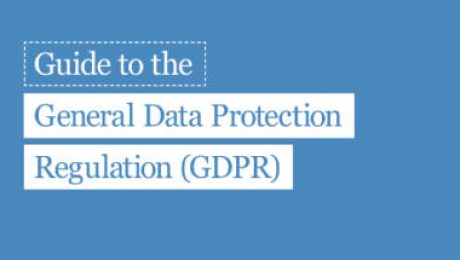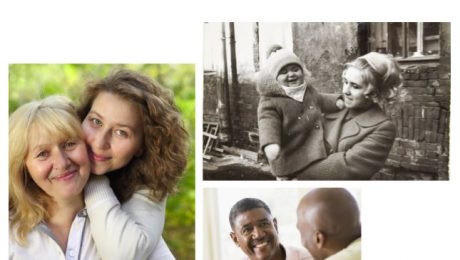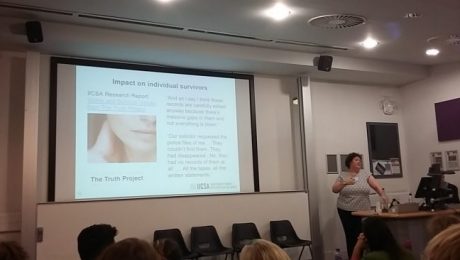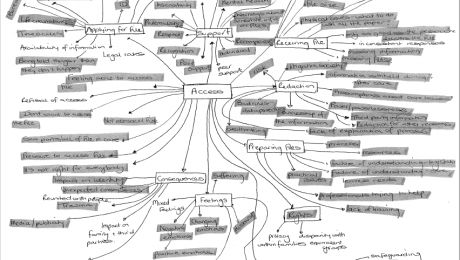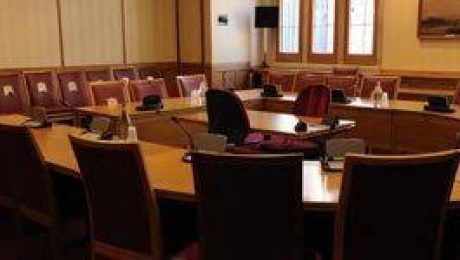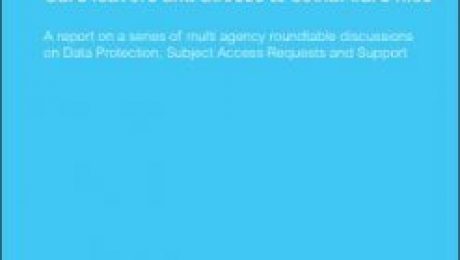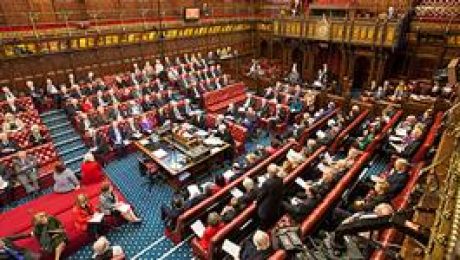ACRCG makes a submission to the Joint Committee on Human Rights
The UK Governmen,t as promised in its most recent election Manifesto, has set up a Review of the Human Rights Act. Its focus is how does the Act work in courtrooms, and the relationship between government, parliament and the courts.
At the same time, Parliament’s Joint Committee on Human Rights called for brief evidence from across the sector to highlight ‘everyday ways’ in which the HRA has been helpful in pushing forward the rights of citizens. We believe that Article 8 which requires public bodies to respect family life is an important right for adult care leavers.
The Access to Records Campaign Croup’s submission to the Joint Committee is set out below. We agreed that the Committee can publish our submission and send it as evidence to the Independent Review.
We want our contribution to push forward on the campaign to get specific legislation outside of the current data protection law to ensure that the rights of adult care leavers to knowledge about their time in care and their family connections are properly acknowledged.
Submission to JCHR on behalf of the Access to Care Records Campaign Group
Who we are
The Access to Care Records Campaign Group works alongside adult care leavers who are seeking to make sense of fragmented memories of growing up in the care of the State. Currently, the only way an adult care leaver can get a copy of their case records is by making a Subject Access Request under the Data Protection Act 2018. For many adult care leavers this process is not an effective way of getting information about their family and their time in State care.
Why we are making a submission
We see no sound reason to alter the Human Rights Act 1998. The Act [HRA] is and must continue to be a central legal resource for individuals marginalised by the State to redress the imbalance in power between them and the State and the consequence of its actions which have life long impact on their identity and their understanding of their origins. It is essential that the courts continue to have the power to rectify actions by public authorities which fali to take into account their duties under the HRA.
Why Articles 6 and 8 are important to adult care leavers
Whilst the Data Protection Act 2018 may, if files have not been carelessly lost or damaged or in fact have few details, enable the adult care leaver to have information about themselves from their case records, often local authorities and other care organisations, are reluctant to exercise their discretion to provide third party information from these records without consent. This defensive practice means that an adult care leaver is too often not able to make narrative sense of who they are and who their family consists of. This clash between the dual rights of respect for an individual’s privacy and the rights of the adult care leaver to know about their family life results in an outcome where much of the key information they are seeking is redacted. There is limited recourse to the Information Commissioner’s Office. The court is, however, the last resort for enforcing rights and Article 6 and Article 8 are key rights for a person who has been removed from their family of origin into the care of the State. And, too often, the State has been a ‘care-less’ parent.
Working with adult care leavers seeking their care records
Social workers and other child welfare professionals embrace the HRA as it enables them to ensure best practice in respecting the rights of an individual and their rights to experience family life and fair process. They know and welcome that they are accountable to the courts for ensuring a rights based professional practice when, at times, the interests of bureaucratic structures within a public authority tend to march in contradiction to the standards of their professional practice. The HRA is a significant and powerful force for reinforcing a practice culture of respect for human rights. Its enforcement at every level in the justice system is critical.
The structure and philosophy of the HRA and its mechanism of enforcement is a powerful tool for advocacy whilst working in partnership with adult care leavers who are consistently marginalised by the system which had responsibility for their care when they were children and young people. Section 3 of the HRA is critical to ensuring the overarching impact of a rights based approach to the interpretation of all legislation, including the Data Protection Act 2018 as well as social care legislation.
Deficits in the independent Review Enquiry
We are submitting this response to the Joint Committee on Human Rights because we consider that the Terms of Reference and the questions of the Review Enquiry are drawn too narrowly to enable campaigning and community advocacy groups to set out effectively how important and central this Act has been to our practice during the 20 years since its implementation. The focus of the current Review is about how the courts have interpreted and implemented the HRA.
What Access to Care Records Campaign Group wants
ACRCG is seeking to achieve legislation which takes the rights of an adult care leaver to their personal and family history outside of data protection legislation and process and replaces the present legal route with a dedicated and more empathetic legislative framework which addresses their unique experiences and rights to knowledge about their family life. For campaigning groups such as ours, the HRA is coherent and effective legislation and a key tenet of partnership with marginalised adult care leavers seeking redress from too frequently the neglectful care of the State.
- Published in General
ICO Guidance on access to records published
Guidance from the Information Commissioner’s Office about responding to an individual’s asking to see what personal data an organisation holds about them
The ICO in October 2020 issued guidance about how organisation should respond to a Subject Access Request. The link is here:
ACRCG responded to the consultation in detail (see our previous post with a link to our response to the consultation), and we are pleased that points we made have been taken up. Although the guidance is not specifically designed to meet the rights of adult care leavers, it has some useful messages for organisations to take on board.
Key messages in the guidance:
- it is a fundamental right of all individuals to know what personal information [data] the organisation holds about them
- a request for this information does not have to be in writing: organisations cannot insist on this but it may be useful to record that a request has been made
- the organisation cannot charge a fee and must provide the personal data within 20 working days
- names of person recording personal data about an individual in a professional capacity should be shared with the individual making the request.
We had made this point very strongly because it is most important and here’s the example given in the guidance:
“….it is reasonable for the council to provide the social worker’s personal data to the requester in response to the subject access request. However, the council must either have the consent of the family member, or consider whether it is reasonable to disclose their personal data without consent. If the council does not have consent, it is likely that it needs to reconcile the individual’s right of access in respect of any duty of confidence owed to the family member.”
It remains to be seen, of course, how the guidance will be interpreted by individual local authority departments and will, no doubt dictate further attention by our Association.
- Published in General
Announcing the launch of the Family Connect Website
Family Action’s FamilyConnect website is a new resource for adults who have been in care and or adopted. The information on the website is to assist them in finding answers to questions they may have about their origins, to help them on their journey to locate records relating to their adoption and care that may exist, and also to find birth family members.
The Family Connect website available at:
https://www.familyconnect.org.uk
It is planned that in due course the Family Connect website will be further developed to include information for birth relatives, professionals, and also for donor-conceived people providing funding becomes available. The website will be reviewed regularly so please let Julia Feast know if you spot anything that could be added or amended: Julia@feastconsultancy.co.uk
- Published in General
MIRRA Symposium, UCL, London
MIRRA stands for “Memory, Identity, Rights in Records, Access”, and has been conducting research into the process of Care Leavers applying for records, sometimes later in life. Today at the University College London was a symposium and conference, at which many fascinating speakers gave presentations.
After an introduction by Professor Elizabeth Shepherd, the opening address was given by Keynote Speaker Elizabeth Denham CBE, the UK Information Commissioner, who emphasised the role of the Information Commissioner’s Office in relation to record keeping, and preservation of personal data. She is the visiting Professor to the UCL where the conference was held. She explained that her history stems from being an archivist in Canada dealing with children from Residential Schools in British Columbia.
After coffee, various contributors to the project gave heart felt speeches about their experiences of applying for their records as care leavers. Victoria Hoyle over-viewed the project and what had been discovered from the research. Quotes from those who had gained access to their records were displayed on screen. The rawness of the various addresses from care leavers were very powerful, amusing, and passionate in equal measure. We also learned from academics and records officers about the practical process of the research and what lessons can be learned.
Victoria also played a very inspiring short film consisting of short quotes from the participants to the project and the research. It highlighted the major points such as how long and irksome the experience of applying for records was for care leavers, how it could be improved. Below you can replay the film.
After lunch we heard from campaigners, and researchers from the UK, Australia, and New Zealand who discussed the role of records in gaining justice for victims and survivors of abuse and neglect. Justine Rainbow from IICSA (Independent Inquiry into Child Sexual Abuse) gave us a summary of the experience of the lack of records in many of the modules currently being conducted as well as the experiences of those giving evidence to the Truth Project. Time and time again the institutions had destroyed useful evidence which IICSA would have liked to examine in order to prove the veracity of none recent allegations
Finally we heard about how a caring approach to records and record keeping could assist care leavers. Representatives from professional bodies, voluntary organisations and service providers talked about what they are doing to support care-experienced people’s rights to records. In particular we heard from the Darren Coyne of the Access to Records Campaign Group, who explained what legislation they are lobbying for to help care leavers over 25 who are looking for records. The Archives and Records Association fielded questions, The representative from British Association of Social Workers explained the desire to help by practitioners but the effect that austerity has upon the wish for improvements and developement. A representative of Family Action outlined a project to set up a website Family Connect in conjunction with Julia Feast, the purpose of which is to help put people in touch with their family from whom they have lost contact. We also heard from the Rees Foundation.
- Published in General
MIRRA – Memory- Identity – Rights in Records – Access
n 2017 we teamed up with University College London who are carrying out a 2 year research project properly funded into the accessing of records with particular emphasis on care records and care leavers experiences.
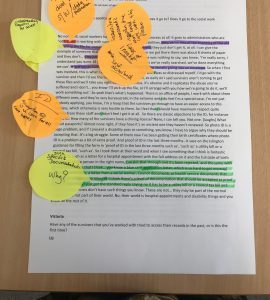
MIRRA is a research project that aims to support the rights of care leavers by exploring how child social care records have been created, kept and used in public and voluntary organisations in England from the mid-20th century to the present day. The acronym stands for Memory – Identity – Rights in Records – Access. It is a participatory action research project co-produced with care leavers in partnership with the Care Leavers Association. Ultimately it aims to make positive changes to social care record keeping and through those changes improve the care leavers’ experiences.
A history of the research can be seen on the MIRRA Blog here
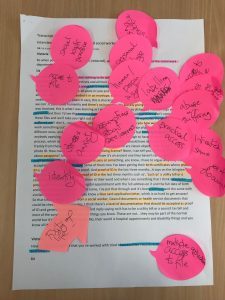
- Published in Research
Action Group Calls For Introduction Of National Standards In Support Of Adult Care Leavers
Group calls for national support framework for adults looking to access their childhood care records
Research exploring experiences of adult care leavers discussed at House of Lords roundtable event
Session chaired by Baroness Young of Hornsey OBE
Access to Care Records Campaign Group calls on Government to do more in their role of ‘corporate parent’
TUESDAY 27TH NOVEMBER 2018 – LONDON, UK – A leading campaign group has called for a national framework that guides local authorities and voluntary organisations to support adults who were in care as children and are now looking to access their care files.
The Access to Care Records Campaign Group is calling on the government to introduce a number of standardised measures to ensure those who access their care records are given sufficient support as they process their contents.
Today the campaign group reveals three strands of research which will be discussed at the House of Lords in a session to be chaired by the cross bench peer Baroness Young of Hornsey OBE.
The first report, published by The Care Leavers’ Association is the result of roundtable discussions across England led by Darren Coyne of CLA and Peter Garsden, President of the Association of Child Abuse Lawyers, which has given invaluable support to the campaign group.
The second report, ‘Battling with a Care-less Process’ was commissioned by The Care Leavers’ Association from Becky Clarke, Senior Lecturer at Manchester Metropolitan University who interviewed 20 adult care leavers, the majority of whom were aged over 40, about their experiences of asking to see all their care records.
A Freedom of Information Analysis Report has also revealed that local authorities generally do not keep records of how many adult care leavers ask to see their care records and appear to have no systems in place to support them.
Each strand of research makes key recommendations as to how the government should be doing more to ensure a standardised approach for adult care leavers asking to see their care records.
These recommendations include:
- An effective process that makes it easier for data governance officers and professionals to share with adult care leavers more information from the records, including information about family members,.
- Avoiding redaction of files wherever possible, keeping accurate records whenever redaction is made and an explanation of the rationale.
- Offer support to all adult care leavers of any age across their life-span and keep open communication throughout the process.
- Provide detailed government guidance for data governance officers in relation to access to care records.
- Information for adult care leavers through diverse media sources about their right to see their care records and the support available to them to do so.
ACRCG believes that current data protection legislation, whilst allowing adult care leavers to access their personal information on their care records, is not designed to deal with requests for family history, information and decisions relating to a person’s time in care. Government did not use the opportunity during the passage through Parliament of the Data Protection Act 2018 to address the serious disadvantages adult care leavers experience.
ACRCG’s ambition is first to ensure the creation of National Standards applying across all sectors to support those adult care leavers making a Subject Access Request under the Data Protection Act 2018.
Ultimately, the Group, working alongside adult care leavers, want to achieve ‘fit for purpose’ legislation which properly recognises the right of all people who grew up in the care of the State to have knowledge of their whole family history and to know what decisions and events have shaped their adult life.
Available for interview
- Darren Coyne, The Care Leavers’ Association
- Peter Garsden, President of the Association of Child Abuse Lawyers
- Becky Clarke, Senior Lecturer in Sociology, Manchester Metropolitan University
For more information or to set up an interview, please contact:
Ryan Sketchley
Editorial Director
Frank
ryansketchley@welcometofrank.com
07889559186
- Published in General, Press Releases
It’s my journey, it’s my life, it’s my identity! Care Leavers and access to social care files
Members of the Access to Care Records Group were asked by the Department of Education to conduct some evidence based research into the issues for Information and Governance Departments of Local Authorities concerning the disclosure of Care Records to Care Leavers following the implementation of the Children’s Act Transitional Guidance published in 2014.
Between June and September 2015, we held some roundtables at various Local Authority invited venues, when we initially gave a talk, then played a film made about the experience of Care Leavers when accessing their care records, then held some workshops at which the views of delegates were sought.
- Published in Research
ACRG secures new Records Regulations under Children Act 1989
Summary
The government has revised the guidance about how local authorities should respond when a person who has grown up in care asks to see their care file. The Guidance is statutory guidance: local authorities are required to follow this unless there is a good reason not to. This guidance is in Volume 3 of government guidance called Planning Transition to Adulthood for Care Leavers.
To download a pdf file of the entire regulations click the button
It states that care leavers have a fundamental right to access information held on their care records. [Para 4.28]
It makes it very clear that the principles and standards for good practice apply to all care leavers regardless of their age. [Para 4.27]
- Published in General
Speech of Baroness Young in House of Lords
The following is an extract of submissions and oratory by Baroness Lola Young on behalf of the Access to Care Records Group as taken from Hansard on 14th October 2013
The following is the text of the proposed amendment to Legislation
To read this page in the form of a pdf file click here
- Published in General, Press Releases


